-
 Bitcoin
Bitcoin $82,014.1421
-1.19% -
 Ethereum
Ethereum $1,803.7058
-1.41% -
 Tether USDt
Tether USDt $1.0001
0.03% -
 XRP
XRP $2.0593
-4.88% -
 BNB
BNB $593.0661
-2.05% -
 Solana
Solana $123.6461
-1.13% -
 USDC
USDC $1.0001
0.00% -
 Dogecoin
Dogecoin $0.1628
-4.07% -
 Cardano
Cardano $0.6393
-5.58% -
 TRON
TRON $0.2331
1.13% -
 Toncoin
Toncoin $3.9040
2.39% -
 Chainlink
Chainlink $13.1480
-4.09% -
 UNUS SED LEO
UNUS SED LEO $9.1039
-5.83% -
 Stellar
Stellar $0.2629
-2.34% -
 Avalanche
Avalanche $18.5339
-3.93% -
 Shiba Inu
Shiba Inu $0.0...01210
-4.08% -
 Sui
Sui $2.2086
-7.00% -
 Hedera
Hedera $0.1579
-7.91% -
 Polkadot
Polkadot $4.0066
-2.36% -
 Litecoin
Litecoin $81.8554
-4.81% -
 MANTRA
MANTRA $6.2317
-2.46% -
 Bitcoin Cash
Bitcoin Cash $297.1179
-3.10% -
 Dai
Dai $1.0000
0.01% -
 Bitget Token
Bitget Token $4.4309
-4.80% -
 Ethena USDe
Ethena USDe $0.9999
0.00% -
 Pi
Pi $0.6964
-9.25% -
 Hyperliquid
Hyperliquid $12.7116
1.48% -
 Monero
Monero $215.2306
-0.46% -
 Uniswap
Uniswap $5.8415
-2.23% -
 Aptos
Aptos $5.1747
-2.52%
How to sync ETH wallet address on Exodus wallet?
To view your ETH address in Exodus, open the wallet, click on the ETH asset, and find the unique alphanumeric string to receive ETH.
Mar 29, 2025 at 02:00 am
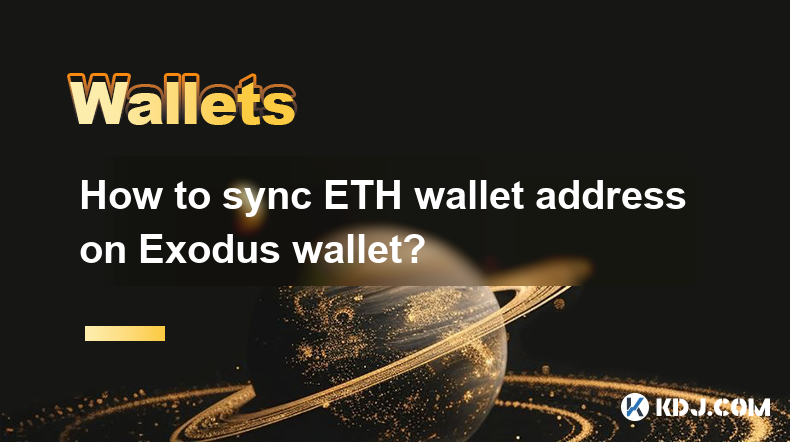
Understanding Exodus Wallet and Ethereum Integration
Exodus is a popular multi-cryptocurrency wallet known for its user-friendly interface. It supports a wide range of cryptocurrencies, including Ethereum (ETH). Syncing your ETH wallet address within Exodus simply means ensuring your wallet is connected to the Ethereum blockchain and can display your ETH balance and transaction history accurately. This isn't a process of "syncing" in the same way you might sync your phone contacts; it's more about ensuring your wallet software is communicating correctly with the Ethereum network. There's no separate "sync" button to press.
Accessing Your ETH Address in Exodus
To view your ETH address, you first need to open your Exodus wallet. Once open, locate the Ethereum (ETH) asset in your wallet's asset list. This will usually be displayed prominently. Clicking on the ETH asset will open a detailed view. Within this view, you'll find your ETH wallet address. This address is a long string of alphanumeric characters, unique to your wallet. This is the address you'll provide to others to receive ETH. Remember to always double-check the address before sending or receiving funds.
Receiving ETH to Your Exodus Wallet
Receiving ETH is straightforward. Simply provide your ETH address (found as described above) to the sender. Once they send the ETH, the transaction will be broadcast to the Ethereum network. Exodus will automatically detect and display the incoming transaction. The time it takes for the transaction to appear in your wallet depends on the network's congestion; it might take a few seconds or several minutes. You can monitor the transaction's progress on a block explorer like Etherscan using your transaction hash (provided by the sender or visible in your Exodus transaction history).
Sending ETH from Your Exodus Wallet
Sending ETH is equally simple. Within the detailed ETH view, you'll find a "Send" button or similar option. Clicking this will open a sending interface. Here, you'll need to enter the recipient's ETH address and the amount of ETH you wish to send. Exodus will calculate the transaction fee (gas fee) automatically, which varies depending on network congestion. Review all details carefully before confirming the transaction. Once confirmed, the transaction will be broadcast to the Ethereum network. Again, you can track its progress on a block explorer.
Troubleshooting Potential Issues
No ETH Balance Showing: If you've received ETH but it's not showing in your Exodus wallet, ensure your wallet is fully updated to the latest version. A restart might also resolve temporary glitches. If the problem persists after checking these, consider contacting Exodus support.
Slow Transaction Confirmation: Network congestion on the Ethereum blockchain can cause delays in transaction confirmations. This is normal, and you don't need to take any action other than waiting. Check the gas fees you're paying; higher fees generally result in faster confirmations.
Incorrect Address Entry: Double and triple-check the recipient's address before sending ETH. Sending to the wrong address results in irreversible loss of funds. Exodus provides warnings to help prevent this, but careful attention is crucial.
Wallet Password Issues: Ensure you have entered your wallet password correctly. Incorrect passwords will prevent access to your funds and prevent transactions. If you've forgotten your password, follow Exodus's password recovery procedures. Never share your seed phrase with anyone.
Hardware Issues: If you experience consistent issues, ensure your device (computer, phone) is functioning correctly. Software conflicts or hardware problems can interfere with wallet functionality.
Understanding Ethereum Gas Fees
Gas fees are transaction fees paid to miners on the Ethereum network for processing transactions. They are crucial for the network's operation and are denominated in Gwei (a smaller unit of ETH). Higher gas fees typically lead to faster transaction confirmations. Exodus automatically calculates and displays the gas fee for your transactions, giving you control over the speed. Always review the gas fee before confirming a transaction, as unexpectedly high fees can affect your overall costs.
Security Best Practices for Your Exodus ETH Wallet
Strong Passwords: Use a strong, unique password for your Exodus wallet. Avoid reusing passwords across multiple accounts.
Seed Phrase Security: Your seed phrase is the key to recovering your wallet. Never share it with anyone, and store it securely offline.
Software Updates: Regularly update your Exodus wallet to benefit from the latest security patches and improvements.
Two-Factor Authentication (2FA): Enable 2FA if available to add an extra layer of security to your account.
Phishing Awareness: Be aware of phishing scams. Exodus will never ask for your seed phrase or password via email or other unsolicited communication.
Frequently Asked Questions
Q: My ETH balance isn't updating. What should I do?
A: Ensure your Exodus wallet is connected to the internet and running the latest software version. Restarting your wallet or device might resolve temporary glitches. If the problem persists, contact Exodus support.
Q: How do I find my ETH transaction hash?
A: Your transaction hash is usually displayed within your Exodus transaction history after sending or receiving ETH. It can also be found on block explorers like Etherscan if you know the transaction details.
Q: What are gas fees, and why are they important?
A: Gas fees are transaction fees paid to Ethereum miners. They determine how quickly your transaction is processed. Higher gas fees generally lead to faster confirmation times.
Q: I sent ETH to the wrong address. Can I recover it?
A: Unfortunately, once you send ETH to the wrong address, it's typically irretrievable. Always double-check the recipient's address before confirming any transaction.
Q: Is Exodus a secure wallet for storing ETH?
A: Exodus employs security measures to protect user funds, but like any wallet, it's crucial to follow best practices such as using strong passwords, enabling 2FA (if available), and keeping your seed phrase secure. No wallet is completely invulnerable to all threats.
Disclaimer:info@kdj.com
The information provided is not trading advice. kdj.com does not assume any responsibility for any investments made based on the information provided in this article. Cryptocurrencies are highly volatile and it is highly recommended that you invest with caution after thorough research!
If you believe that the content used on this website infringes your copyright, please contact us immediately (info@kdj.com) and we will delete it promptly.
- CZ Announces Plan to Donate 500 BNB Each to Myanmar and Thailand
- 2025-03-31 20:00:12
- Bitcoin (BTC -2.46%) has earned a place in almost every investor's portfolio.
- 2025-03-31 20:00:12
- Bitcoin (BTC) ETF Witnessed a Major Shift as Investors Pulled out $93 Million
- 2025-03-31 19:55:12
- Nigeria Accuses Binance of Facilitating Terrorism and Kidnapping Financing
- 2025-03-31 19:55:12
- A Sentiment Shift Appears Underway Within the XRP Community
- 2025-03-31 19:50:12
- A Quarter of S&P 500 Firms Could Be Holding Bitcoin on Their Balance Sheets by 2030: Report
- 2025-03-31 19:50:12
Related knowledge

How to easily generate a Bitcoin payment address
Mar 29,2025 at 10:49am
Generating a Bitcoin payment address might seem daunting, but it's actually quite straightforward. This process is crucial for receiving Bitcoin, as each transaction requires a unique address. Understanding how this works is fundamental to using Bitcoin effectively. This guide will walk you through the simple steps, regardless of your technical experti...
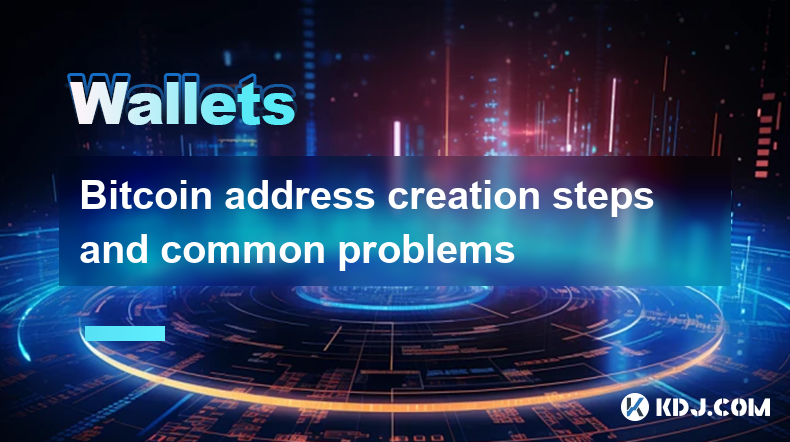
Bitcoin address creation steps and common problems
Mar 30,2025 at 06:07am
Understanding Bitcoin AddressesA Bitcoin address is a unique identifier, similar to a bank account number, used to receive Bitcoin. It's a string of alphanumeric characters generated from a public key, derived from your private key. Understanding the distinction between public and private keys is crucial for Bitcoin security. Your private key should be...
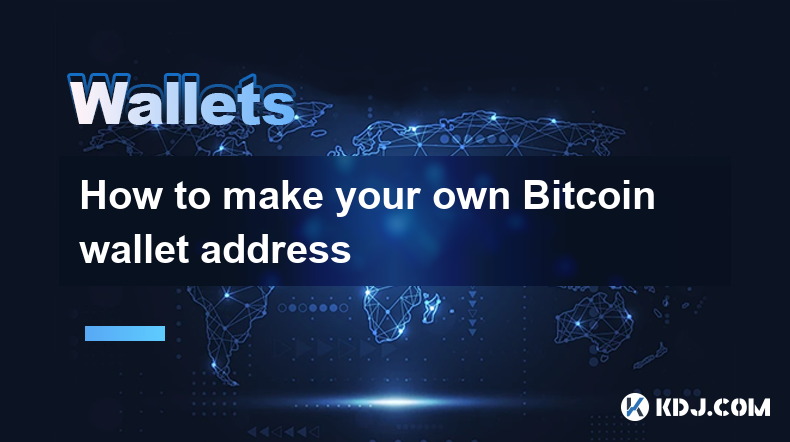
How to make your own Bitcoin wallet address
Mar 29,2025 at 08:42pm
Creating your own Bitcoin wallet address is crucial for securing and managing your Bitcoin holdings. It allows you to independently receive and send Bitcoin without relying on third-party services. This process involves understanding the different types of wallets and choosing the one that best suits your needs and technical expertise. Incorrectly gene...
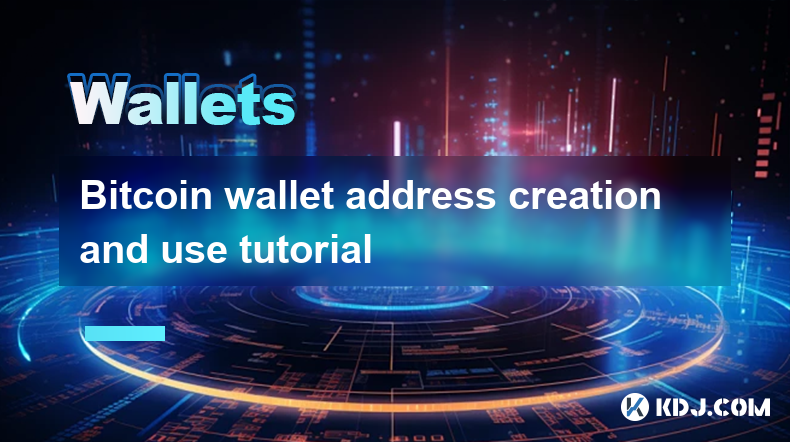
Bitcoin wallet address creation and use tutorial
Mar 29,2025 at 10:14pm
Understanding Bitcoin Wallet AddressesA Bitcoin wallet doesn't store Bitcoin in the way a traditional bank account does. Instead, it stores private keys, which are cryptographic secrets allowing you to access and spend your Bitcoin. Your Bitcoin address, on the other hand, is a public identifier, like an email address, that others can use to send you B...

Bitcoin address generation and secure storage guide
Mar 30,2025 at 08:07am
Understanding Bitcoin AddressesA Bitcoin address is essentially your public key, a string of alphanumeric characters used to receive Bitcoin. It's analogous to your bank account number. Unlike your private key, which is crucial for spending your Bitcoin, your address can be shared publicly without compromising your funds. Generating a new address is sim...
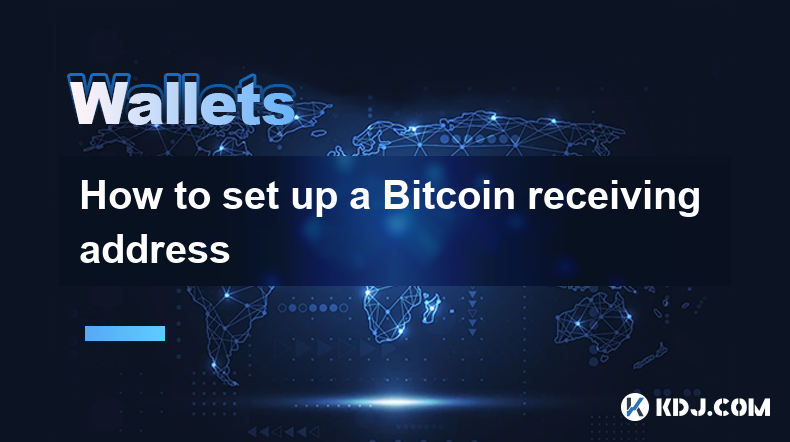
How to set up a Bitcoin receiving address
Mar 30,2025 at 06:14pm
Understanding Bitcoin Receiving AddressesA Bitcoin receiving address is essentially your unique identifier on the Bitcoin network. It's a string of alphanumeric characters that allows others to send Bitcoin to you. Think of it like your bank account number, but specifically for Bitcoin. You need a receiving address to receive Bitcoin. Crucially, you ca...

How to easily generate a Bitcoin payment address
Mar 29,2025 at 10:49am
Generating a Bitcoin payment address might seem daunting, but it's actually quite straightforward. This process is crucial for receiving Bitcoin, as each transaction requires a unique address. Understanding how this works is fundamental to using Bitcoin effectively. This guide will walk you through the simple steps, regardless of your technical experti...

Bitcoin address creation steps and common problems
Mar 30,2025 at 06:07am
Understanding Bitcoin AddressesA Bitcoin address is a unique identifier, similar to a bank account number, used to receive Bitcoin. It's a string of alphanumeric characters generated from a public key, derived from your private key. Understanding the distinction between public and private keys is crucial for Bitcoin security. Your private key should be...

How to make your own Bitcoin wallet address
Mar 29,2025 at 08:42pm
Creating your own Bitcoin wallet address is crucial for securing and managing your Bitcoin holdings. It allows you to independently receive and send Bitcoin without relying on third-party services. This process involves understanding the different types of wallets and choosing the one that best suits your needs and technical expertise. Incorrectly gene...

Bitcoin wallet address creation and use tutorial
Mar 29,2025 at 10:14pm
Understanding Bitcoin Wallet AddressesA Bitcoin wallet doesn't store Bitcoin in the way a traditional bank account does. Instead, it stores private keys, which are cryptographic secrets allowing you to access and spend your Bitcoin. Your Bitcoin address, on the other hand, is a public identifier, like an email address, that others can use to send you B...

Bitcoin address generation and secure storage guide
Mar 30,2025 at 08:07am
Understanding Bitcoin AddressesA Bitcoin address is essentially your public key, a string of alphanumeric characters used to receive Bitcoin. It's analogous to your bank account number. Unlike your private key, which is crucial for spending your Bitcoin, your address can be shared publicly without compromising your funds. Generating a new address is sim...

How to set up a Bitcoin receiving address
Mar 30,2025 at 06:14pm
Understanding Bitcoin Receiving AddressesA Bitcoin receiving address is essentially your unique identifier on the Bitcoin network. It's a string of alphanumeric characters that allows others to send Bitcoin to you. Think of it like your bank account number, but specifically for Bitcoin. You need a receiving address to receive Bitcoin. Crucially, you ca...
See all articles






















































































